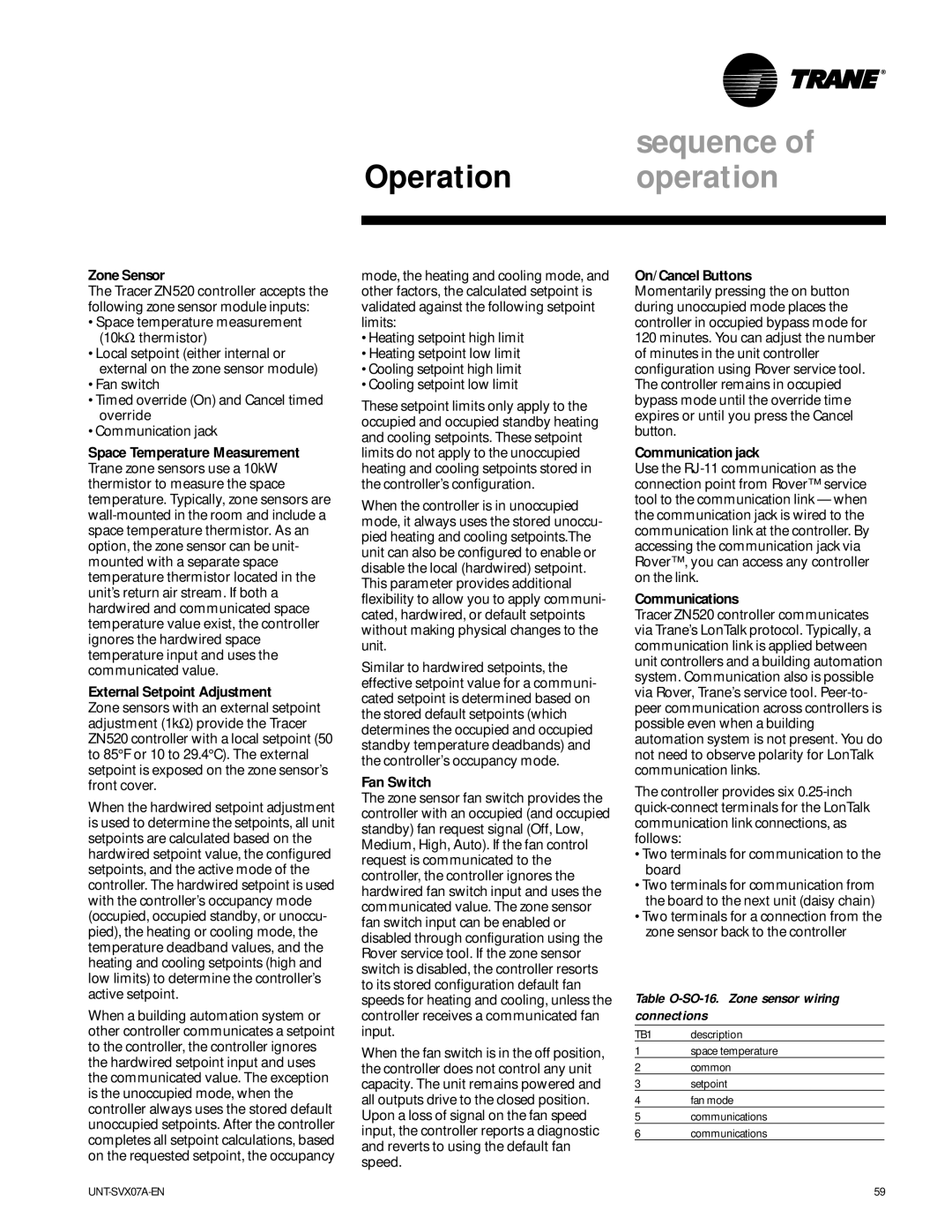
sequence of
Operation operation
Zone Sensor
The TracerZN520 controller accepts the following zone sensor module inputs:
•Space temperature measurement (10kΩ thermistor)
•Local setpoint (either internal or external on the zone sensor module)
•Fan switch
•Timed override (On) and Cancel timed override
•Communication jack
Space Temperature Measurement Trane zone sensors use a 10kW thermistor to measure the space temperature. Typically, zone sensors are
External Setpoint Adjustment
Zone sensors with an external setpoint adjustment (1kΩ ) provide the Tracer ZN520 controller with a local setpoint (50 to 85°F or 10 to 29.4°C). The external setpoint is exposed on the zone sensor’s front cover.
When the hardwired setpoint adjustment is used to determine the setpoints, all unit setpoints are calculated based on the hardwired setpoint value, the configured setpoints, and the active mode of the controller. The hardwired setpoint is used with the controller’s occupancy mode (occupied, occupied standby, or unoccu- pied), the heating or cooling mode, the temperature deadband values, and the heating and cooling setpoints (high and low limits) to determine the controller’s active setpoint.
When a building automation system or other controller communicates a setpoint to the controller, the controller ignores the hardwired setpoint input and uses the communicated value. The exception is the unoccupied mode, when the controller always uses the stored default unoccupied setpoints. After the controller completes all setpoint calculations, based on the requested setpoint, the occupancy
mode, the heating and cooling mode, and other factors, the calculated setpoint is validated against the following setpoint limits:
•Heating setpoint high limit
•Heating setpoint low limit
•Cooling setpoint high limit
•Cooling setpoint low limit
These setpoint limits only apply to the occupied and occupied standby heating and cooling setpoints. These setpoint limits do not apply to the unoccupied heating and cooling setpoints stored in the controller’s configuration.
When the controller is in unoccupied mode, it always uses the stored unoccu- pied heating and cooling setpoints.The unit can also be configured to enable or disable the local (hardwired) setpoint. This parameter provides additional flexibility to allow you to apply communi- cated, hardwired, or default setpoints without making physical changes to the unit.
Similar to hardwired setpoints, the effective setpoint value for a communi- cated setpoint is determined based on the stored default setpoints (which determines the occupied and occupied standby temperature deadbands) and the controller’s occupancy mode.
Fan Switch
The zone sensor fan switch provides the controller with an occupied (and occupied standby) fan request signal (Off, Low, Medium, High, Auto). If the fan control request is communicated to the controller, the controller ignores the hardwired fan switch input and uses the communicated value. The zone sensor fan switch input can be enabled or disabled through configuration using the Rover service tool. If the zone sensor switch is disabled, the controller resorts to its stored configuration default fan speeds for heating and cooling, unless the controller receives a communicated fan input.
When the fan switch is in the off position, the controller does not control any unit capacity. The unit remains powered and all outputs drive to the closed position. Upon a loss of signal on the fan speed input, the controller reports a diagnostic and reverts to using the default fan speed.
On/Cancel Buttons
Momentarily pressing the on button during unoccupied mode places the controller in occupied bypass mode for 120 minutes. You can adjust the number of minutes in the unit controller configuration using Rover service tool. The controller remains in occupied bypass mode until the override time expires or until you press the Cancel button.
Communication jack
Use the
Communications
TracerZN520 controller communicates via Trane’s LonTalk protocol. Typically, a communication link is applied between unit controllers and a building automation system. Communication also is possible via Rover, Trane’s service tool.
The controller provides six
•Two terminals for communication to the board
•Two terminals for communication from the board to the next unit (daisy chain)
•Two terminals for a connection from the zone sensor back to the controller
Table O-SO-16. Zone sensor wiring connections
TB1 | description |
1 | space temperature |
2 | common |
3 | setpoint |
4 | fan mode |
5 | communications |
6 | communications |
59 |
